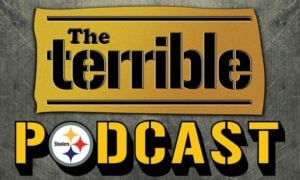There are a number of factors that must play into a team’s decision to draft a certain player at a certain spot. But there is one common denominator that ties them all together. He has to be a good player whom you believe can be good for your team. Period. Full stop. Everything else is secondary or irrelevant.
That was pretty much what Pittsburgh Steelers General Manager Kevin Colbert philosophized about during the team’s pre-draft press conference earlier in the week during a number of portions of the event, touching on the topic in responses to different questions.
At one point he was asked if there were any positions at which they are not looking because they believe they have everything they need there. “We’re never going to close the door on any position, because if a great player’s available at a position you think you’re great at, you’re probably going to pass greatness for mediocrity, and that’ll eventually catch up to you”, he said.
While that might be technically true, it is more often than not irrelevant an practical terms. The Steelers don’t need a quarterback but if an Andrew Luck-level prospect was available to them, it’s possible that they would consider drafting him, even though that’s never going to actually happen.
Later on in the draft, Colbert had a lengthy response to a question that concerned the value of a team or schematic fit as it concerns a prospect versus talent level. “It’s always going to be a factor”, he said. “If they’re rated close, if the player that’s slightly below the other one is a better fit, then of course you’re going to take him”.
“But if you drop into a significantly different depth in a round, you’re going to make a mistake, and that’s been proven time and time, historically”, he added. “Drafting for need has never built a winning franchise. And I can say that without really ever having studied it because I don’t know what teams’ philosophy is”.
Drafting for need is good in theory but in practical application is almost impossible to see it line up with the talent available consistently enough for it to be a sustainable strategy. If you only ever draft players that you ‘need’, you’re going to acquire a group of mediocre players at the end of the day.
Colbert talked about how the Steelers have been built this way organizationally since Chuck Noll and Art Rooney. Jr. began to construct the championship rosters of the 1970s, and then on through Bill Cowher’s tenure, onto the present day with Mike Tomlin.
He noted that you will draft for need sometimes, and the Steelers certainly have—and paid for it. Artie Burns is the most prominent example in recent years and that was a decision that likely has set them back a couple years.








